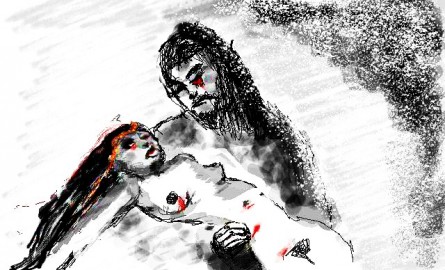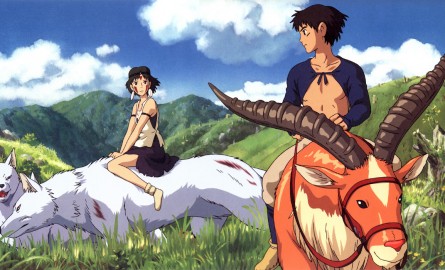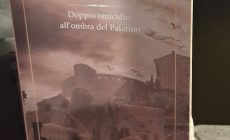by Claudio Consoli
(linguistic adaptation by Professoressa Marianna Cannatelli)
 The thin and sharp rays of light that almost hurt your eyes used to half darkness withdrew silently towards their source, as fast as the clouds which pushed by strong winds hide the sun in the high autumn sky, while beneath, in the thickness of a northern wood, our senses sharpen so as to answer to a primitive instinct of preservation which starts up as soon as the colors of the leaves of the trees change from numberless and brilliant nuances of green to a dull and cold blue, which fades away against the darker bark of ancient trees.
The thin and sharp rays of light that almost hurt your eyes used to half darkness withdrew silently towards their source, as fast as the clouds which pushed by strong winds hide the sun in the high autumn sky, while beneath, in the thickness of a northern wood, our senses sharpen so as to answer to a primitive instinct of preservation which starts up as soon as the colors of the leaves of the trees change from numberless and brilliant nuances of green to a dull and cold blue, which fades away against the darker bark of ancient trees.
The sensation of a pastoral walk in a lively and uncontaminated environment turns into a circle in the tunnel of ancestral fears: just a moment before you were admiring the beauty of the leaves and the quiet presence of small insects on the bushes and the low branches when they start turning into long claws which scratch your limbs, like arms trying to hinder your movements.
Anything that made you feel a sense of freedom in nature has turned into some kind of trap full of disturbing sounds which sublimate your modern man’s sound certainties in a cloud of pumped up smells which are invariably caught by a fleeting predator. Your alarm turns into fear when the perception of a certain cold presence materializes in the freezing look of intelligent and cunning eyes which stare at you from the half-light of an undergrowth.
Imagine you meet a wolf in a situation like that, imagine you meet a wolf pack and that you fear you may end up at the mercy of their hunger and then realize their intention is not that, even if the reality of their instinct, which includes your fears too, remains evasive, and therefore stimulates your lively curiosity and wish to understand and catch that singe and plural obscure entity which is represented by the pack.
Once more the role are reversed, now you are trying to chase him, thinking, and perhaps you have almost made it, you have understood some of their dynamics but you question everything again when the pack takes a fast and unexpected turning, perhaps going towards an area of the wood which you still find inaccessible: and there you are alone once more, needing and willing to strain your sense and sensibility hoping that when they’ll stop to have a rest you’ll be able to understand their intention.
That’s when you think, even for a short while, that you are a member of the pack, at least until the next, fast, wild and unexpected escape into the forest.
Following, listening and loving the Ulver’s music (wolves in Norwegian) is such an experience: difficult, wild, mysterious, at times extremely rewarding but surely not for everyone.
The artistic career of this Scandinavian group started in 1993 with the first self-produced demos “Rehearsal” and “Vargnatt” (the night of the wolf, varg is a synonymous of ulv, from which derive he words warg and worg often used from Tolkien onwards) and ended with “Wars of the roses” released few time ago.
During the last eighteen years, apart from the the irony suggested by the chronological coincidence, the group has reached, in their latest album, an expressive maturity which seems to contain, in the space of only seven tracks, their different musical souls, during a career which can be considered unexpected and original. But to better explain that it’s necessary for us to go through their discography.
expressive maturity which seems to contain, in the space of only seven tracks, their different musical souls, during a career which can be considered unexpected and original. But to better explain that it’s necessary for us to go through their discography.
The music of the wolf puppies takes its first step in the field of Black Metal music, habitual and predictable for a Scandinavian band, both in their debut demo and their first record (produced by “Head Not Found”) “Bergtatt” (mesmerized) from 1995: fast rhythmic with rutilant drums, screaming and growling, dark atmospheres all according to plans, also considering that “Bergtatt” is a sort of concept album that tells the story of a young girl who gets lost in a forest full of trolls. But already in these first albums we can see mainly folk and melodic moments and a singing that does not deal only with the stylistic elements of black metal; all this suggests that in the pack there are latent genes that are only waiting to emerge.
Already with their second album, under contract with “Head Not Found”, the group produced an ambitious as unexpected album: “Kveldssanger” (1996), a record of pure Scandinavian folk which shares with Black Metal only themes and atmosphere.
In their twilight songs you feel as if you were sitting by a camp-fire listening to wild and sad vikings sing about epic deeds and sad stories worth of Snorri’s Edda with the typical death/black metal singing which evolves naturally in a baritone and evocative choirs accompanied by acoustic and traditional instruments.
After this turning point the Ulver drew up a rich contract with a bigger record company and maybe also for this reason, in 1997 they produced a more canonical album “Nattens Madrigal” another concept album on lycanthropy (and what else) that will represent their last work which can be considered Black Metal, this genre which they will abandon for good from then onwards as to experiment and sail, like good vikings, across unexplored seas, landing though, as far as production goes, in a safe harbor: the “Jester Records” run by Krystoffer Riggs, the singer of the band from the beginning to these days. With “Jester Records” the group is going to reissue their first works and produce “Themes from Wiliam Blake’s The Marriage of Heaven and Hell” a daring record inspired by W.Blake which had ambient and electronic influences.
As you can guess from the title, the changing process reveals itself and takes place in their next Ep “Metamorphosis” (1999) but even more in the must “Perdition City” (2000) with which the group enters into the new millennium with a fantastic record, that goes from electronic and drum and bass nuances of their previous work to go a step forward and “break into” musical fields closer to groups like Massive Attack and Portishead.
We are therefore in the Trip Hop, Ambient circle but yet the atmosphere and the sonority of the record remind us of the nocturnal and crepuscular origin of the band, suggesting to our imagination, urban scenarios, at times borderline and schizoid (e.g. the song Catalept with its quote of Psycho’s theme) even thanks to samples, loops, or lyrics spoken in an almost disturbing tone.
Listening to this record is like leaving the nature and the forests inhabited by trolls and wild, mysterious creatures almost as if we wished to find their urban counterpart in the asphalt jungle with all its tormented and shuttered inhabitants, even though, as if often happens with the Ulver, the shades are often violated by flashes of lights, which in this electronic record, are expressed by a wonderful sax, which together with rhythms and drum beats, sounding jazzy at times, accompany us through this city of perdition.
These brighter elements illuminates the scene just like the trails of street lamps that run fast on both sides of the street which we imagine to be driving through it in a dark glassed car so as to almost isolate ourselves from everything though, at the same time, we want to look at everything voyeuristically.
The “urbanization” of the wolves produces an inevitable period of confusion during which experimentation probably gives way to a little chaos with the production of various minor works in which the singing almost disappears and is replaced by virtually hypnotic and obsessive loops, which, at times, recall and stretch to the limit the best intuitions present in “Perdition City”.
The Eps “Silence teaches you how to sing” and “Silencing the singing” (2001) followed by a compilation “1993-2003 first decade in the machines” and two soundtracks “Lykantropen themes” (2003) and “Svidd Neger” (2004) all belong to this period which is, honestly, not remarkable except for the fanatics of the band.
In 2005 this phase of the Ulver’s career gave birth to “Blood Inside”, a record containing echoes of the most complicated King Crimson’s progressive, avantgarde electronic, industrial sounds and traces of the various experiments carried out through the years. This record presents, surprisingly, a sort of organic unity and narrative expressive coherence which make it absolutely worth listening to.
In the following 6 years the Ulver produced only 2 records…but what records!
If in the obscure urban landscape of “Perdition City” flashes of light suggested extemporary scenes of contemporary life, in “Shadows of the sun”(2007) instead, the musical narration lingers in the almost ossimoric patches of shade of the sun.
Here we are traveling once more accompanied by Rigg’s mature and very deep voice which caresses and guides us, with the warmth and authority typical of a father’s strong and big hand, through a musical ambient which make us think of an ancient nature and impending forces which transcend our being humans and mortals, and for this very reason they can’t but attract and scare us at the same time, which their mesmerizing forces we can barely understand.
“Shadows of the sun” is a wonderful record, in which the use of electronic isn’t disturbing or a means of experimentation, but is now an expressive instrument of the group, which produces tracks full of a highly imaginative power as warm as an autumn sun can still be, but, at the same time, veiled by a melancholy and a mysticism that has probably always been a feature of the Ulver, but fits in perfectly in a coherent and expressive record.
instrument of the group, which produces tracks full of a highly imaginative power as warm as an autumn sun can still be, but, at the same time, veiled by a melancholy and a mysticism that has probably always been a feature of the Ulver, but fits in perfectly in a coherent and expressive record.
Drums and percussions, rhythmic bars in general, are virtually absent but appear every now and then to underline moments of musical climax, again a splendid and relaxing saxophone which reaches an emotionally touching beauty in the incredible cover of Black Sabbath’s classic “Solitude”, piano passages and insubstantial synthesizers, all these elements often give us the sensation of being in front of something which is beyond the threshold of perception.
Recently released is instead “Wars of the roses”, which after the oniric journey and the melancholy peace of the previous album, reintroduces more rocky rhythmic passages, an album in which we find again more chaotic and progressive moments creating a musical consistency which is less ethereal but once again coherent and achieved in its peculiar sound.
This record, which probably represents the synthesis of “Blood Inside” and “Shadows of the Sun”, definitely establish the artistic maturity of the Ulver.
In “Wars Of the Roses” we can find all the ingredients of the artistic formula of the group: dissonance and clear chaos just like in “February MMX”, in the end of “Norwegian Gothic” and in “England”, songs where we can find a biting and almost harsh singing; romanticism and sadness (one over all: “Providence” with the duet Riggs/Siri Stranger); guitar melodies vaguely lisergic, in which resound echoes of the earlier Pink Floyd like in “Island”; a melodic taste which, at times, emerges even in its occasional simplicity as in “September IV” and eventually quotes more or less learned and very popular, as in the definitive “Stone Angel”, in which the keyboard player O’Sullivan sings the poem of a contemporary American poet Keith Waldrop.
In conclusion the Ulver are a group whose music is surely unusual, at least for the average music fan in Italy, but exactly for this reason it is extremely interesting and surely worth of attention and of being listened to. I wonder if anyone of you will answer to the howl of the Ulver and tired of sunny and Mediterranean visions and landscapes, doesn’t decide to follow them in the thickness of a primeval, wild, majestic and sad forest.












Leave a Reply
Your email address will not be published. Required fields are marked (required)